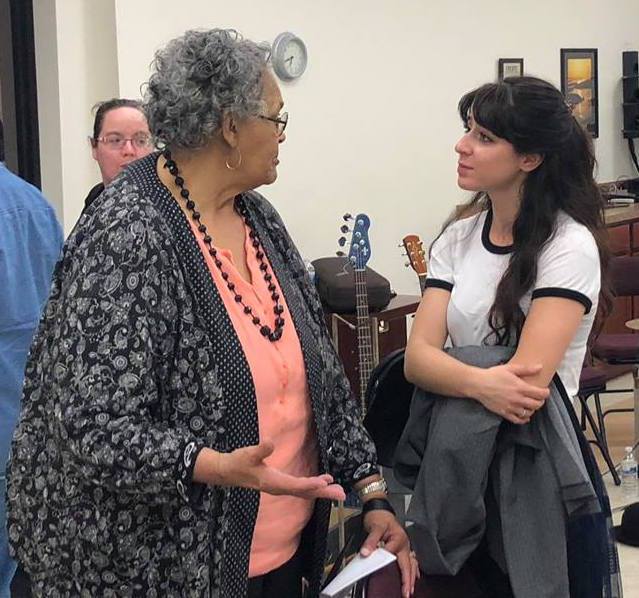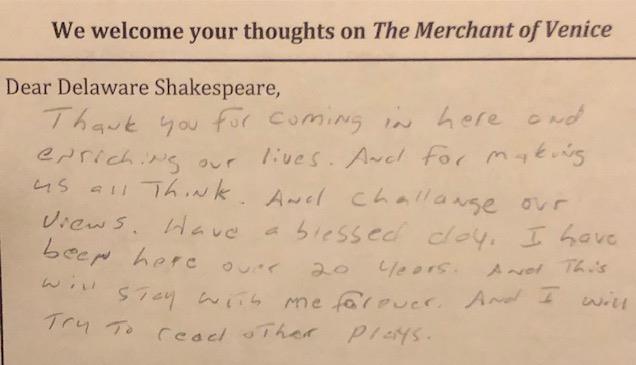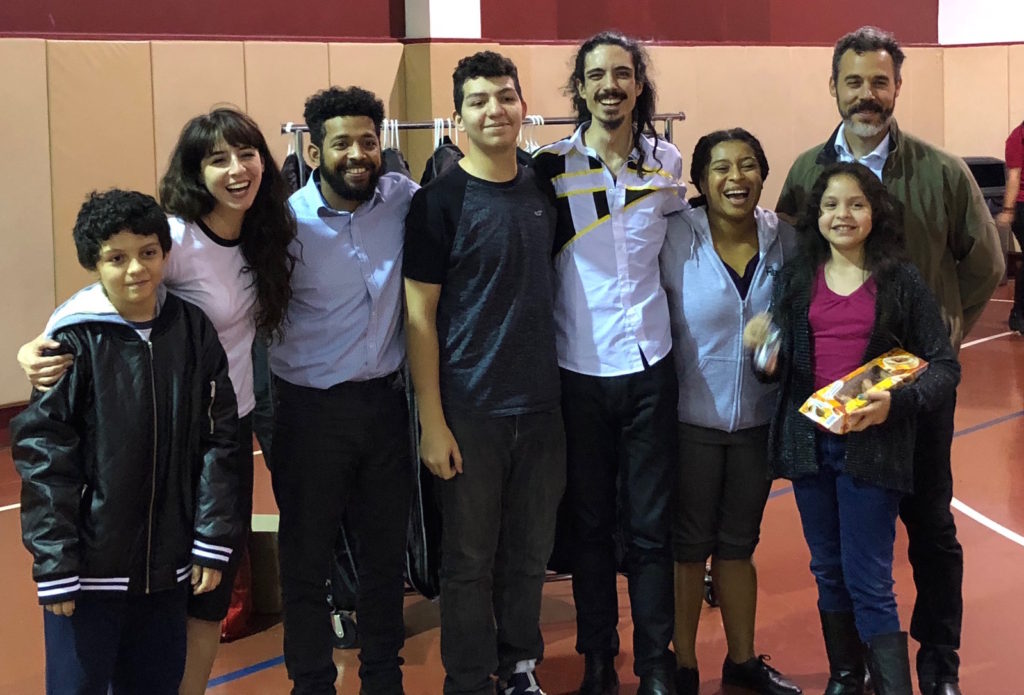With twenty performances offered over four weeks, The Merchant of Venice was our longest running production ever. The production launched intense, but respectful conversations about the rise in anti-Semitism and other instance of hate speech and hate crime in our country. Producing Artistic Director David Stradley shares three highlights from the road.
First State Community Action Agency – October 31
One of the great things about the Community Tour model is that it is purposefully intimate – so the number of people doesn’t really matter. We’ve had great shows for 20 people…and 120 people.
On our first trip to Sussex County on this year’s tour, we were warmly greeted on Halloween by a small but passionate audience that was with us from the start and responded vocally throughout. A photographer from the Cape Gazette came to snap a few pictures at the beginning, got hooked, and stayed for the entire production.

Many of the people in attendance were clearly individuals who had spent their lives working for social justice and progress in their communities. This led to a very passionate and honest conversation where we struggled with such questions as whether the fights against anti-Semitism and racism were linked or in conflict with each other, and whether hope could be found in light of the shootings in Pittsburgh. Some found hope in God, others found hope in historic trends that showed an overall decrease in anti-Semitic attitudes.
We were humbled that members of the staff of First State Community Action Agency, who do so much to move communities forward, found inspiration and rejuvenation in the play that resonated with their mission.
Sussex Correctional Institution – November 6
Each year, a different combination of circumstances leads to a certain venue hosting “the magic” performance. We never know which one it will be, but we always know as we are in the midst of it. This year it was the performance at Sussex Correctional Institution.
From the very beginning, the men were leaning forward, nodding along, responding, listening, making connections.
At intermission, the men leapt into conversation with each other. One man stopped a company member and asked him, “Do you know what we are talking about? We’re trying to figure out whether Shylock is just a stereotype of negative Jewish characteristics or whether the discrimination and hatred he faced drove him to his actions?” When asked which way they were leaning, the man said, “I think it’s all the hatred around him.”
So it was clear these men were deeply engaged. And then, in the second half, the real magic happened.
This is a play with major themes of justice and mercy, and in which a trial scene takes on huge significance. To say it resonated with the men is quite the understatement. The cast could feel this, and it pushed them onward.
Liz Filios’ “quality of mercy” speech took on intense and beautiful meaning – it was variously a positive wish towards the inmates, a challenge to those in authority to wield their judging power wisely, and a prayer for everyone involved in the criminal justice system that actions are restorative and not just punitive.

The discussion following the performance was just as powerful. The final question we asked was what in the play resonated with the lives of the men.
One man said what stood out to him was Shylock’s inability to find a productive way to deal with his anger – and that the man’s own struggles with anger had brought him to prison.
Another man said he really connected to the idea that every action had consequences – and that pretty much everybody who took action in the play ended up with bad consequences.
The final man to speak said he was haunted by the fear that when he got out of prison no one would be able to see him as anything besides a criminal, just like no one in the play could ever get beyond seeing Shylock as “the Jew.”
We were honored to share the experience with the inmates and security personnel at SCI. (No pictures were allowed – so we’re sharing an image of a survey from this performance.)
Latin American Community Center – November 9
This was the first time we offered a tour performance specifically for the Latino community in Wilmington. Initially the staff at the LACC wasn’t sure how much interest there would be among Latinos for Shakespeare, but they ended up hearing from several of their clients that “I’m a big Shakespeare fan.”

A very rainy night may have dampened enthusiasm and kept attendance lower than anticipated, but a warm welcome awaited us in the gym where we performed. Parents with very young children were able to attend and walk their little ones around the edges of the gym when needed. A mom with three middle school-aged children arrived a little late, but were quickly sucked into the action. The daughter watched most of the play perched excitedly on her knees so she could see more.
This was my favorite talkback of the tour. Our production aimed to explore how people who see each other as different can co-exist in respectful ways. We had a beautiful example at this performance. LACC staff member and Del Shakes board member Laura Adarve translated the entire post-show conversation into Spanish and English. English speakers and Spanish speakers sat respectfully as audience members voiced their opinions in their native tongue, waiting for Laura to translate the insights. The dialogue was enriched by this authentic experience of valuing that which is different than you.




